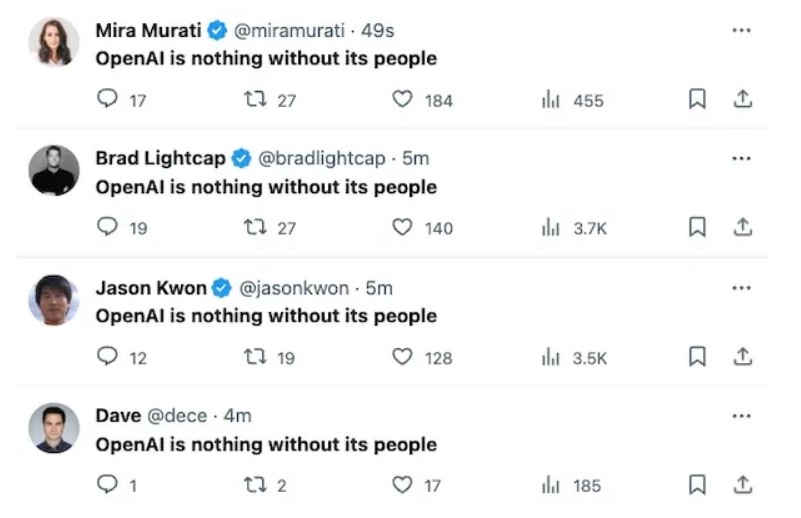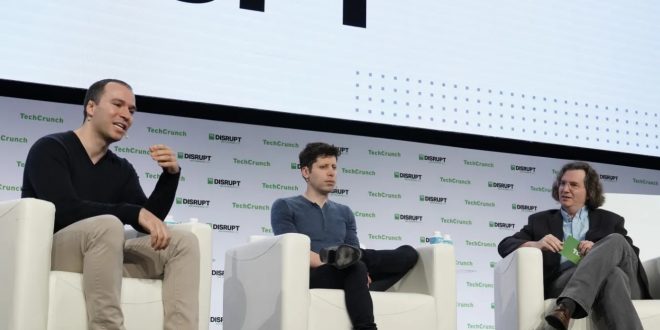After three days of deliberation following Altman’s unexpected firing by OpenAI’s board, Microsoft CEO Satya Nadella announced on Monday that Altman and OpenAI co-founder Greg Brockman will lead a “new advanced AI research team.”
Brockman was among the many OpenAI employees to resign in protest last week. Nadella has appointed Altman as the head of Microsoft’s new artificial intelligence division. I am excited to see you establish a distinct identity and culture within Microsoft, just as we have with GitHub, Mojang Studios, and LinkedIn. We have learned a lot over the years about empowering creators and innovators to do so.
Nadella said they would be joined by “colleagues” like Altman and Brockman. Former OpenAI stars Szymon Sidor, Jakub Pachocki, and Aleksandr Madry, according to a post by Brockman on X, have joined Microsoft.
“We look forward to moving quickly to provide them with the resources needed for their success,” Nadella said, a statement that several tech startup founders praised as an example of “incredible execution.” Brockman wrote that the new team will construct “something new, and it will be incredible.”
After investing $10 billion in OpenAI and acquiring roughly 50% ownership, Nadella said Microsoft remains committed to the venture.
OpenAI’s board’s unexpected action reportedly surprised Microsoft. It’s impressive that Nadella convinced and found a familiar new home for OpenAI’s ex-leaders before Monday’s market opening.
Altman has represented OpenAI, the most valuable U.S. startup. It’s largely considered to be dominating the AI race and has become the kingmaker for thousands of firms developing its software in less than a year. OpenAI investment has aided Microsoft’s AI efforts and attracted several businesses.
OpenAI’s action surprised many business leaders and investors and served as a warning that the company might find it difficult to keep up without Altman’s direction. Microsoft’s strategic acquisition of Altman and Brockman strengthens its competitive advantage, preventing other major technology companies from snatching their knowledge and boosting Wall Street’s optimism about Microsoft’s future.
“The mission continues,” Altman said after Nadella announced the 38-year-old entrepreneur had joined Microsoft.
Microsoft made the move after the OpenAI board, investors, staff members, and Altman failed to get the entrepreneur back to the startup over the weekend. Instead, OpenAI’s board picked former Twitch CEO and co-founder Emmett Shear as interim CEO, shocking Altman. A request for comment from OpenAI was ignored.

Earlier this weekend, Altman pitched investors a new AI startup, the New York Times reported.
We are committed to our cooperation with OpenAI and confident in our product roadmap, capacity to innovate with everything we announced at Microsoft Ignite, and customer and partner support. We’re excited to meet Emmett Shear and OAI’s new leadership team and collaborate, Nadella said.
The OpenAI board dismissed Altman for not being “consistently candid” in his discussions. Its lack of explanation outraged many OpenAI employees. “The board had a chance to explain their drastic actions, and they did not take it,” OpenAI research scientist Andrej Karpathy wrote on X.
Wedbush analysts dubbed the decision “earthquake,” saying OpenAI’s innovation is “essence the core hearts and lungs of Redmond’s Copilot and enterprise strategy.” The Saturday report, viewed by, stated: “Losing the key torchbearer around the AI strategy in Altman as well as Brockman is a clear near-term (and potentially long-term) blow to some of the future strategic initiatives at OpenAI.”
On Monday, OpenAI’s top talent, including CTO Mira Murati, criticized the board’s decision, which has caused several to depart. “OpenAI is nothing without its people,” he tweeted.
Shear wrote on X Monday that OpenAI’s Altman removal process and communication “have been handled very badly, which has seriously damaged our trust.” Over the next 30 days, Shear aims to appoint an independent investigator to investigate Altman’s removal process, consult with stakeholders, and restructure OpenAI’s management and leadership team to better serve consumers.
Based on the results and what we learn from them, I will promote organizational reforms, including pressing for significant governance changes if necessary. I will release these when they become obvious over the next 30 days. OpenAI’s stability and success are too vital to risk disturbances like this. I will try to address the primary concerns, but I think it may take more than a month to make progress, he wrote.
“I admire Sam and the OpenAI team. An amazing firm, research initiative, and software application I’m here to safeguard and grow it because I know that.
 Tech Gadget Central Latest Tech News and Reviews
Tech Gadget Central Latest Tech News and Reviews




